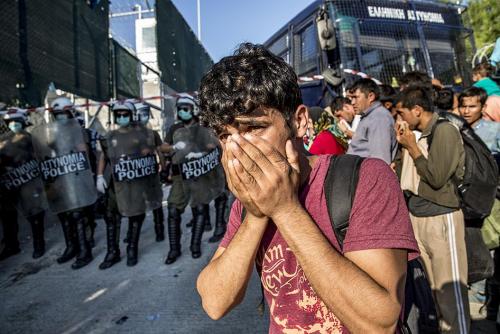Greece: Chaos, Insecurity in Registration Center
Information, Attention to Vulnerable Groups Urgently Needed
Poor organization and a lack of personnel is creating chaos and insecurity at a police registration center and surrounding informal camp for asylum seekers and migrants on the Greek island of Lesbos, Human Rights Watch said on October 12.

A man suffers effects of tear gas used by police to disperse a crowd of hundreds of migrants and asylum seekers awaiting police registration in a tense, chaotic atmosphere at Moria registration center on the Greek island of Lesbos. October 4, 2015.
In a visit to Lesbos on October 4 and 5, 2015, Human Rights Watch found that women with young children, pregnant women, and people with disabilities or medical conditions are often not identified as vulnerable groups nor ensured that they can register and get proper access to basic services such as food and health care.
“After months with huge numbers of people arriving in Lesbos, the authorities still don’t have an effective system for registering people so that they can travel onward,” said Eva Cossé, Greece specialist. “This is causing unnecessary security problems for the police and hardship for asylum seekers and migrants, especially for women and children and people with disabilities who can’t force their way to the head of the registration line.”
Registration is an administrative police procedure separate from applying for asylum. Virtually no one applies for asylum on Lesbos, though it is allowed. Regardless of nationality, almost all continue their journey to other EU countries to apply for asylum. Many hope to reunite with family members.
Human Rights Watch staff witnessed the confusion and tension at the Moria registration center created by the numbers of people and lack of information and interpreters. Aid workers and police at the center said that procedures have changed several times, generating more uncertainty.
lack of interpreters and an effective communications system, combined with people’s desperation to move on, has created a volatile situation, with information traveling by word of mouth and large numbers converging in a short space of time. Human Rights Watch witnessed violent disorder on October 4, which left one man briefly unconscious. Police in riot gear used tear gas to control an unruly crowd desperate to register.
The authorities have said that people with special vulnerabilities are entitled to priority in the registration procedure, but people are not aware of this, and the police appear to have no system in place nor to make any effort to identify these groups.
“There is no planning,” one Iranian man told us, “How can they do this?”
Conditions in the makeshift camp are abysmal. UNHCR, the UN refugee agency, and other humanitarian groups have provided tents but hygienic conditions are very poor. Many people sleep outdoors, on the dirt or on little more than a blanket on the ground. There is no separation of women and children from unrelated men, raising concerns about the risk of sexual harassment and violence.
Adee, a Somali woman traveling alone with her four young children, said she was scared to be surrounded by so many men. The night before we spoke, she had awakened to find a man with his legs over her 7-year-old daughter’s body. There is no established mechanism for reporting such incidents.
“It is appalling to see children with medical conditions and disabilities lying in the dirt as flies buzz around their eyes,” Cossé said. “The authorities should coordinate with humanitarian groups to ensure that people with particular needs are identified quickly and ensured access to the registration process and unhindered access to doctors.”
Although the makeshift camp around the Moria registration center is informal, the authorities have an obligation to ensure adequate first reception facilities as people await a necessary police procedure, and to take special measures to protect women and children, as well as to identify people with particular vulnerabilities.
The registration process should be organized to ensure separation of families with children, and women traveling alone, from single men. Appropriately trained police officers or other civil servants – including women – should be deployed at the entrance to the informal camp and should walk through the camp to identify groups in need of special services, including families with young children, pregnant women, persons with disabilities, the elderly, and the ill.
The informal camp is a de facto reception center, and the authorities should ensure appropriate conditions and services, including the separation of families and single women from unrelated adult men. Female staff members should be available at the center, and all staff members should be trained to respond to reported cases of sexual and gender-based violence.
The Greek authorities, working in close coordination with humanitarian organizations, should adopt measures to ensure the safety and rights of all migrants and asylum seekers. There is a clear need for more information, and for the information to be communicated in a timely manner and in relevant languages.
A loudspeaker system throughout the camp could give people important information about the procedure, where people should stand, and make announcements about scheduled food distribution and where to seek medical care. The police guarding the doors should have interpreters with them as much as possible. Additional staff to conduct registration would help process people more quickly.
“It’s a tough situation for everyone at Moria camp, and there are no perfect solutions,” Cossé said. “But the authorities should do a lot more to guarantee safety and basic rights for the thousands of people there, without forgetting that some of them need special attention.”
Source: Human Rights Watch
- 528 reads
Human Rights
Ringing FOWPAL’s Peace Bell for the World:Nobel Peace Prize Laureates’ Visions and Actions

Protecting the World’s Cultural Diversity for a Sustainable Future

The Peace Bell Resonates at the 27th Eurasian Economic Summit

Declaration of World Day of the Power of Hope Endorsed by People in 158 Nations

Puppet Show I International Friendship Day 2020

